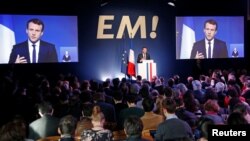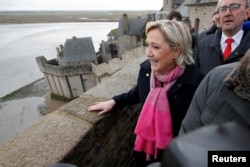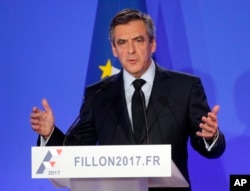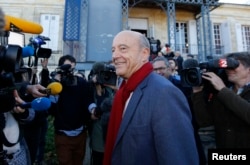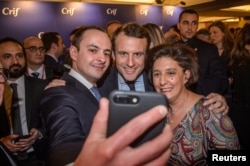France's next president may be a 39-year-old maverick former economy minister, affiliated with no mainstream political party and with no experience running for office. Until now.
On Thursday, and with less than two months to go before the first round of voting, independent centrist Emmanuel Macron finally unveiled his full political platform, outlining proposals ranging from downsizing France's parliament and slashing government bureaucracy, to embracing closer European Union cooperation, fighting nepotism and rewarding businesses that hire from low-income neighborhoods.
The former investment banker also positioned himself as a champion of the middle and working classes, as he described growing up in a midsize French town and being educated in"the schools of the Republic."
Once dismissed as a passing fad with no tangible proposals, Macron is now in second place behind far-right National Front candidate Marine Le Pen ahead of the first round of voting April 23, but according to many surveys, he could win the May 7 runoff.
Macron’s ‘young but he really listens’
New polls out this week confirm the trend, with the latest by Elabe finding Macron behind far-right front runner Le Pen 24 percent to 27 percent in the first round, with former conservative prime minister Francois Fillon trailing in third place, with 19 percent. It found Macron beating Le Pen in the second-round with 62 percent of the vote.
Wading into a farm fair outside Paris earlier this week, a must-attend event for all presidential wannabes, Macron got a taste of deep voter discontent, as he wiped off the goo from an egg pelted at his head during the visit.
But he gets the vote of 71-year-old Joseph Rolland, whose son is a cattle farmer near Nantes, in western France.
"He's young but he really listens," Rolland said. "People say he has no political experience, but he'll surround himself with competent people. We need change."
Hiring scandal hurts Fillon
Fillon, once-considered a shoe-in to become France's next president, is struggling for survival amid a parliamentary jobs hiring scandal involving his family.
With Fillon's support base vanishing, some conservatives are calling for another ex-prime minister, Alain Juppe, to step up and take his place. A Harris Interactive poll finds three-quarters of French want Fillon to abandon a race that 80 percent believe he will lose.
Le Pen’s immunity lifted
Le Pen and her party also face a corruption investigation regarding questionable hiring practices, in this case involving European Parliament funds. She refuses to pay a $300,000 parliament fine or to appear before magistrates before the elections, citing her immunity as an European Union lawmaker.
Thursday, the parliament voted to lift Le Pen's immunity on a separate matter involving tweeting graphic images of Islamic State militant group killings in 2015.
"Emmanuel Macron wants to situate himself in the intersection of the right and left," French analyst Bruno Cautres told Le Midi Libre newspaper in an overall assessment of his platform. "His program offers economic measures of the center right ... and also social dimensions and investments in the future, like training and the environmental transition."
Favors European Union
Macron also calls for closer ties to the European Union and for shoring up the eurozone, in sharp contrast with Le Pen, who wants to hold a Frexit referendum on leaving the bloc if it doesn't renegotiate French membership.
"For the European Union, the best candidate is Macron," said analyst Philippe Moreau Defarges of the French Institute of International Relations in Paris. "But can he be elected? There are a lot of question marks. He's got no political machine. He's a young man. He's inexperienced, he's never been elected."
Macron, who speaks fluent English, also drew sharp differences with the U.S. administration on free trade and climate change.
But he also outlined areas of cooperation with the U.S., including intelligence sharing on Iraq and Syria and said he would pursue a strategic relationship with Washington as president.
Make France business friendly
Macron has long rebelled being pigeon-holed, joining the leftist government of President Francois Hollande as economy minister. His legislation to make France more business friendly, voted in as the Macron law,' and new labor reform proposals were watered down amid protests and strikes.
Last April, he launched his "En Marche!" or "Forward!" movement, which he describes as neither right nor left. A few months later, he resigned to prepare for his presidential candidacy, a move critics called a betrayal to Hollande, his former mentor. The deeply unpopular Hollande ultimately chose not to run for re-election.
Macron is the son of a doctor, who studied philosophy before graduating from the elite Ecole Nationale d'Administration, he is married to his high school French teacher, who is 20 years his senior.




